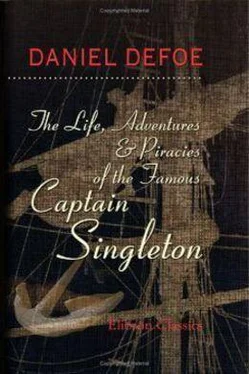At night we all came together to see what we had got; and it appeared we had found, in that day's heap of earth, about fifty pounds' weight of gold dust, and about thirty–four pounds' weight more in all the rest of our works in the river.
It was a happy kind of disappointment to us, that we found a full stop put to our work; for, had the quantity of gold been ever so small, yet, had any at all come, I do not know when we should have given over; for, having rummaged this place, and not finding the least grain of gold in any other place, or in any of the earth there, except in that loose parcel, we went quite back down the small river again, working it over and over again, as long as we could find anything, how small soever; and we did get six or seven pounds more the second time. Then we went into the first river, and tried it up the stream and down the stream, on the one side and on the other. Up the stream we found nothing, no, not a grain; down the stream we found very little, not above the quantity of half an ounce in two miles' working; so back we came again to the Golden River, as we justly called it, and worked it up the stream and down the stream twice more apiece, and every time we found some gold, and perhaps might have done so if we had stayed there till this time; but the quantity was at last so small, and the work so much the harder, that we agreed by consent to give it over, lest we should fatigue ourselves and our negroes so as to be quite unfit for our journey.
When we had brought all our purchase together, we had in the whole three pounds and a half of gold to a man, share and share alike, according to such a weight and scale as our ingenious cutler made for us to weigh it by, which indeed he did by guess, but which, as he said, he was sure was rather more than less, and so it proved at last; for it was near two ounces more than weight in a pound. Besides this, there was seven or eight pounds' weight left, which we agreed to leave in his hands, to work it into such shapes as we thought fit, to give away to such people as we might yet meet with, from whom we might have occasion to buy provisions, or even to buy friendship, or the like; and particularly we gave about a pound to our black prince, which he hammered and worked by his own indefatigable hand, and some tools our artificer lent him, into little round bits, as round almost as beads, though not exact in shape, and drilling holes through them, put them all upon a string, and wore them about his black neck, and they looked very well there, I assure you; but he was many months a–doing it. And thus ended our first golden adventure.
We now began to discover what we had not troubled our heads much about before, and that was, that, let the country be good or bad that we were in, we could not travel much further for a considerable time. We had been now five months and upwards in our journey, and the seasons began to change; and nature told us, that, being in a climate that had a winter as well as a summer, though of a different kind from what our country produced, we were to expect a wet season, and such as we should not be able to travel in, as well by reason of the rain itself, as of the floods which it would occasion wherever we should come; and though we had been no strangers to those wet seasons in the island of Madagascar, yet we had not thought much of them since we began our travels; for, setting out when the sun was about the solstice, that is, when it was at the greatest northern distance from us, we had found the benefit of it in our travels. But now it drew near us apace, and we found it began to rain; upon which we called another general council, in which we debated our present circumstances, and, in particular, whether we should go forward, or seek for a proper place upon the bank of our Golden River, which had been so lucky to us, to fix our camp for the winter.
Upon the whole, it was resolved to abide where we were; and it was not the least part of our happiness that we did so, as shall appear in its place.
Having resolved upon this, our first measures were to set our negroes to work, to make huts or houses for our habitation, and this they did very dexterously; only that we changed the ground where we at first intended it, thinking, as indeed it happened, that the river might reach it upon any sudden rain. Our camp was like a little town, in which our huts were in the centre, having one large one in the centre of them also, into which all our particular lodgings opened; so that none of us went into our apartments but through a public tent, where we all ate and drank together, and kept our councils and society; and our carpenters made us tables, benches, and stools in abundance, as many as we could make use of.
We had no need of chimneys, it was hot enough without fire; but yet we found ourselves at last obliged to keep a fire every night upon a particular occasion. For though we had in all other respects a very pleasant and agreeable situation, yet we were rather worse troubled with the unwelcome visits of wild beasts here than in the wilderness itself; for as the deer and other gentle creatures came hither for shelter and food, so the lions and tigers and leopards haunted these places continually for prey.
When first we discovered this we were so uneasy at it that we thought of removing our situation; but after many debates about it we resolved to fortify ourselves in such a manner as not to be in any danger from it; and this our carpenters undertook, who first palisaded our camp quite round with long stakes, for we had wood enough, which stakes were not stuck in one by another like pales, but in an irregular manner; a great multitude of them so placed that they took up near two yards in thickness, some higher, some lower, all sharpened at the top, and about a foot asunder: so that had any creature jumped at them, unless he had gone clean over, which it was very hard to do, he would be hung upon twenty or thirty spikes.
The entrance into this had larger stakes than the rest, so placed before one another as to make three or four short turnings which no four–footed beast bigger than a dog could possibly come in at; and that we might not be attacked by any multitude together, and consequently be alarmed in our sleep, as we had been, or be obliged to waste our ammunition, which we were very chary of, we kept a great fire every night without the entrance of our palisade, having a hut for our two sentinels to stand in free from the rain, just within the entrance, and right against the fire.
To maintain this fire we cut a prodigious deal of wood, and piled it up in a heap to dry, and with the green boughs made a second covering over our huts, so high and thick that it might cast the rain from the first, and keep us effectually dry.
We had scarcely finished all these works but the rain came on so fierce and so continued that we had little time to stir abroad for food, except indeed that our negroes, who wore no clothes, seemed to make nothing of the rain; though to us Europeans, in those hot climates, nothing is more dangerous.
We continued in this posture for four months, that is to say, from the middle of June to the middle of October; for though the rains went off, at least the greatest violence of them, about the equinox, yet, as the sun was then just over our heads, we resolved to stay awhile till it passed a little to the southward.
During our encampment here we had several adventures with the ravenous creatures of that country; and had not our fire been always kept burning, I question much whether all our fence, though we strengthened it afterwards with twelve or fourteen rows of stakes or more, would have kept us secure. It was always in the night that we had the disturbance of them, and sometimes they came in such multitudes that we thought all the lions and tigers, and leopards and wolves of Africa were come together to attack us. One night, being clear moonshine, one of our men being upon the watch, told us that he verily believed he saw ten thousand wild creatures of one sort or another pass by our little camp, and ever as they saw the fire they sheered off, but were sure to howl or roar, or whatever it was, when they were past.
Читать дальше












